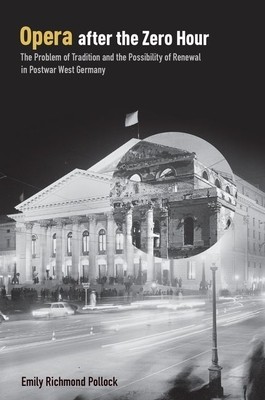
- We will send in 10–14 business days.
- Author: Emily Richmond Pollock
- Publisher: Oxford University Press, USA
- ISBN-10: 0190063734
- ISBN-13: 9780190063733
- Format: 16 x 23.6 x 1.8 cm, hardcover
- Language: English
- SAVE -10% with code: EXTRA
Reviews
Description
Opera After the Zero Hour: The Problem of Tradition and the Possibility of Renewal in Postwar West Germany presents opera as a site for the renegotiation of tradition in a politically fraught era of rebuilding. Though the "Zero Hour" put a rhetorical caesura between National Socialism and postwar West Germany, the postwar era was characterized by significant cultural continuity with the past. With nearly all of the major opera houses destroyed and a complex relationship to the competing ethics of modernism and restoration, opera was a richly contested art form, and the genre's reputed conservatism was remarkably multi-faceted.Author Emily Richmond Pollock explores how composers developed different strategies to make new opera "new" while still deferring to historical conventions, all of which carried cultural resonances of their own. Diverse approaches to operatic tradition are exemplified through five case studies in works by Boris Blacher, Hans Werner Henze, Carl Orff, Bernd Alois Zimmermann, and Werner Egk. Each opera alludes to a distinct cultural or musical past, from Greek tragedy to Dada, bel canto to Berg. Pollock's discussions of these pieces draw on source studies, close readings, unpublished correspondence, institutional history, and critical commentary to illuminate the politicized artistic environment that influenced these operas' creation and reception. The result is new insight into how the particular opposition between a conservative genre and the idea of the "Zero Hour" motivated the development of opera's social, aesthetic, and political value after World War II.
EXTRA 10 % discount with code: EXTRA
The promotion ends in 19d.17:59:44
The discount code is valid when purchasing from 10 €. Discounts do not stack.
- Author: Emily Richmond Pollock
- Publisher: Oxford University Press, USA
- ISBN-10: 0190063734
- ISBN-13: 9780190063733
- Format: 16 x 23.6 x 1.8 cm, hardcover
- Language: English English
Author Emily Richmond Pollock explores how composers developed different strategies to make new opera "new" while still deferring to historical conventions, all of which carried cultural resonances of their own. Diverse approaches to operatic tradition are exemplified through five case studies in works by Boris Blacher, Hans Werner Henze, Carl Orff, Bernd Alois Zimmermann, and Werner Egk. Each opera alludes to a distinct cultural or musical past, from Greek tragedy to Dada, bel canto to Berg. Pollock's discussions of these pieces draw on source studies, close readings, unpublished correspondence, institutional history, and critical commentary to illuminate the politicized artistic environment that influenced these operas' creation and reception. The result is new insight into how the particular opposition between a conservative genre and the idea of the "Zero Hour" motivated the development of opera's social, aesthetic, and political value after World War II.


Reviews